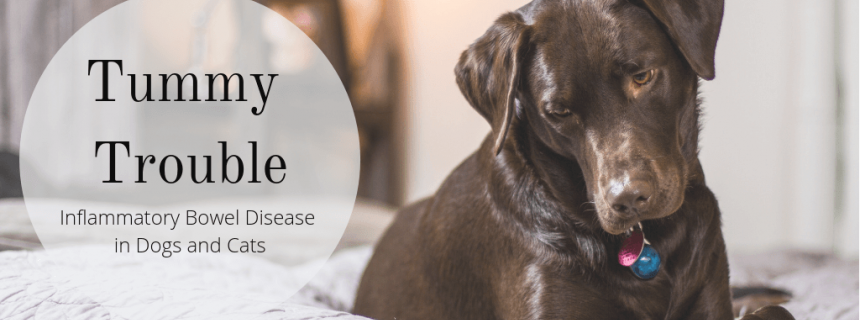Tummy Trouble: Inflammatory Bowel Disease in Dogs and Cats
Is it a simple stomachache—or something more serious? While some causes of gastrointestinal upset in dogs and cats can be easily explained by dietary indiscretion (like rummaging through the trash), a bout with intestinal parasites, or even a change in food, others aren’t so clear.
If you just can’t seem to get your pet’s tummy trouble under control, inflammatory bowel disease (IBD) may be the culprit. A thorough workup with your veterinarian can help narrow down the issue and get your pet’s digestive health back on track.
What Is IBD?
IBD is not one specific disease; rather, it is a term used to describe a group of conditions characterized by chronic inflammation and irritation of the intestines and stomach.
What Are the Signs?
Because IBD can affect different parts of the GI tract, the clinical signs can vary. The two most common signs of IBD are vomiting (when the stomach is involved) and diarrhea (when the intestines are involved). In some pets, both parts of the digestive tract are involved, so both vomiting and diarrhea occur. If the disease occurs for several weeks to months, weight loss and poor appetite are also common.
What Causes IBD?
While the exact cause is unknown, several factors, including genetics, allergies, immune system health, and underlying disease may play a role in the development of IBD.
 How Is It Diagnosed?
How Is It Diagnosed?
To successfully diagnose IBD, your veterinarian will need to start by ruling out any other possible causes for your pet’s stomach issues, including diseases like diabetes and pancreatitis, GI obstructions, intestinal parasites, and cancer. To do this, your veterinarian will recommend lab tests and diagnostic imaging to gather additional information.
The only way to confirm a diagnosis of IBD is with an intestinal biopsy. The chronic irritation that causes IBD stimulates the body to send cells from the immune system to the affected area. Thus, the disease is diagnosed when these cells are identified in abnormal levels in the tissue.
To obtain these cells, a biopsy is performed by passing an endoscope into the pet’s stomach or colon under anesthesia. A tiny biopsy instrument is then passed through the endoscope and used to take small samples of the lining, or mucosa, of the affected organ. These samples are then sent to a pathologist for examination under a microscope. If an abnormal inflammatory response is confirmed, further testing may still be required to determine the cause of the reaction.
How is IBD treated?
The ideal way to treat IBD is to diagnose and treat the underlying disease causing the inflammatory response; however, a definitive cause cannot always be found. In this case, the disease is called idiopathic, meaning there is no known cause. Many cases of IBD are considered idiopathic. Options for treating idiopathic IBD include:
- Food trial: Some pets with IBD will respond to a change in diet. Your veterinarian can help you select a high-fiber or novel-protein diet (one that contains a protein source your pet has never been exposed to, such as duck or fish) to try. For the test diet to be effective, however, it must be fed exclusively for four to six weeks.
- Antibiotic trial: In some cases, GI signs may be associated with an imbalance of bacteria in the digestive tract. Your veterinarian may suggest a trial course of antibiotics to correct this imbalance.
- Medication: If dietary and/or antibiotic therapy is not effective, corticosteroids may be prescribed to suppress the inflammatory response in the GI tract. Your veterinarian will work with you to find the lowest effective dose for your pet and may eventually recommend therapy be discontinued to evaluate whether it is still necessary. If the signs of IBD recur after medication is discontinued, treatment should be resumed for maintenance. Depending on your pet’s condition, your veterinarian may also recommend the use of other supplements, such as probiotics.
Unfortunately, long-term therapy is required for many pets diagnosed with IBD. Most cases cannot be cured, but can be effectively managed with your veterinarian’s guidance.
Is your pet struggling with stomach issues? We’re here to help! contact us or schedule an appointment today.


